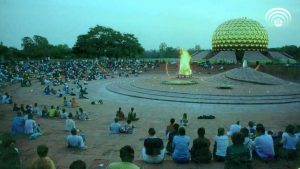Auroville, often referred to as the “City of Dawn,” is a place where the pursuit of peace and harmony is a fundamental principle. This unique international township, situated amidst the serene landscapes of Southern India, has developed a distinctive approach to conflict resolution. Auroville’s collective method goes beyond mere conflict management; it aims to foster lasting peace through dialogue, understanding, and shared responsibility.
The Collective Approach to Conflict Resolution
At the heart of Auroville’s conflict resolution model is the collective approach. Instead of relying on traditional hierarchical structures or adversarial methods, Auroville emphasizes a shared responsibility to address and resolve conflicts. This approach is deeply ingrained in the township’s ethos and has been instrumental in maintaining its peaceful atmosphere.
Dialogue and Mediation
One of the key components of Auroville’s collective approach to conflict resolution is open and honest dialogue. When conflicts arise, residents are encouraged to engage in constructive conversations that allow all parties involved to express their perspectives and concerns. This emphasis on communication helps to unearth the root causes of conflicts and paves the way for peaceful solutions.
Mediation is a common practice in Auroville. Residents who are skilled in conflict resolution often volunteer to help mediate disputes. These mediators are neutral parties who facilitate conversations between conflicting parties, helping them reach mutually acceptable agreements. Mediation is seen as a way to avoid escalation and promote understanding.
Shared Responsibility
Auroville’s collective approach to conflict resolution places the onus on the entire community. Residents are not passive bystanders in conflict; they are actively engaged in finding solutions. This shared responsibility fosters a sense of unity and ownership in resolving issues, reinforcing the idea that peace is a collective endeavor.
In many cases, individuals and groups affected by conflicts work together to find common ground and develop mutually beneficial solutions. This collaborative effort ensures that conflicts are not swept under the rug but are addressed openly and with a commitment to resolution.
Restorative Justice
Restorative justice is another integral aspect of Auroville’s conflict resolution model. The focus is not on punitive measures but on restoring relationships and addressing the harm caused by conflicts. This approach emphasizes empathy, accountability, and reconciliation.
When conflicts have occurred, restorative justice processes are initiated. They provide a space for those involved to understand the impact of their actions on others and work towards making amends. This approach prioritizes healing and transformation, allowing conflicts to serve as opportunities for personal and collective growth.
Consensus-Based Decision-Making
Consensus-based decision-making, a cornerstone of Auroville’s governance model, also plays a role in conflict resolution. The collective process ensures that all voices are heard, and decisions are made collaboratively. When conflicts are related to communal matters, this approach is particularly valuable in finding equitable solutions.
Residents actively participate in decision-making processes, allowing them to shape the community’s direction and address issues that may lead to conflicts. This shared ownership of decisions fosters a sense of accountability and a commitment to peaceful coexistence.
Educational Initiatives for Conflict Resolution
Auroville’s commitment to peace extends to its educational initiatives. Children and young adults are taught conflict resolution skills from an early age. These skills not only serve them well in their personal lives but also contribute to the overall peaceful atmosphere of the community.
Schools in Auroville often incorporate conflict resolution programs that teach students how to express their feelings, listen to others, and find peaceful solutions to conflicts. The emphasis on empathy and communication empowers the younger generation to become effective mediators and peacemakers.
Cultural Exchange and Interconnectedness
Auroville’s international composition fosters a rich tapestry of cultures and traditions. The practice of cultural exchange and intercultural dialogue serves as a powerful tool for conflict prevention. Residents are encouraged to celebrate and embrace the unique traditions and practices of the world’s cultures, fostering a sense of unity and respect for diversity.
Annual festivals, art exhibitions, and workshops are organized to promote cultural exchange and understanding. These experiences create opportunities for residents to learn about and appreciate different cultures, breaking down cultural barriers and promoting peaceful coexistence.
Environmental Stewardship and Sustainability
Auroville’s commitment to environmental stewardship and sustainability also plays a role in conflict resolution. By actively engaging in projects related to eco-friendly practices, afforestation, and the use of renewable energy sources, residents minimize potential conflicts related to resource use and environmental issues.
The shared responsibility for sustainability efforts reinforces a sense of unity and accountability. Residents understand that their actions have an impact on the environment and are committed to finding solutions that promote harmony with nature.
The Global Relevance of Auroville’s Collective Approach
Auroville’s collective approach to conflict resolution holds global significance. As the world faces increasing challenges related to social and political divisions, Auroville’s model offers a compelling example of peaceful coexistence. It showcases the potential of collective responsibility, dialogue, and shared understanding in resolving conflicts.
In a time when traditional conflict resolution methods often perpetuate animosity and divisions, Auroville’s approach offers an alternative path to lasting peace. It highlights the importance of empathy, accountability, and reconciliation as tools for transformation.
In Conclusion
Auroville’s collective approach to conflict resolution is a testament to the transformative power of community. It demonstrates that through shared responsibility, dialogue, and a commitment to peaceful coexistence, conflicts can be resolved in ways that promote understanding and unity.
As the world grapples with complex issues and deep-rooted conflicts, Auroville’s model stands as a testament to the power of collective responsibility in shaping a more peaceful and harmonious future. It reminds us that when individuals come together with a shared vision and commitment to dialogue, they can overcome obstacles and build a world where peace is not just an aspiration but a living reality.



